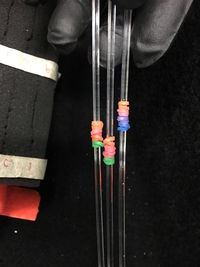Fiber Numbering Procedure
This page was created by Andrew Sampino, whose logbook for Spring 2016 can be found here
The fiber numbering system is the means by which the fused and unfused waveguides are identified.
Original System
Originally, the fibers were collected in groups of thirty and given a group identifier with colored straps. Each strap color corresponds to a bundle number, the number to strap color conversion can be found on the first page of this google sheet. Within the bundles, each fiber had a relative identifier consisting of two colored rubber bands. The two colors corresponded to a two digit base six number, which allowed for thirty six (six squared) unique fiber identification numbers (only thirty were used). The band color to number conversion is as follows:
Purple = 0
Pink = 1
Orange = 2
Yellow = 3
Green = 4
Blue = 5
The rubber band closest to the fused end (or to be fused end) of the waveguide is the sixes place and the rubber band closest to the non fused end is the ones place. For example, from upstream (towards fuse end) to downstream a purple band followed by a blue band corresponds to a zero in the sixes place and a five in the ones place giving a relative fiber number of five (0*6 + 5*5 = 5), yellow green corresponds to twenty two (3*6 + 4*1 = 22), and orange purple corresponds to twelve (2*6 + 0*1 = 12). This method allows identification within bundles, but once it is separated from the bundle it cannot be uniquely identified. This posed two issues; first, if for some reason a fiber was separated from its bundle it would've been difficult to identify. Second, if fibers needed to be moved from one bundle to another there would be no way to discern that fiber from the fiber that shares its relative identification number in the destination bundle. For these reasons the numbering scheme was switched to the current system.
Current System
The current system allows for a unique number to be given to every fiber, which is independent of the bundle to which it belongs. There are 360 fibers in total, so the system was changed from two digit base six to four digit base six (allowing for 6^4 or 1296 unique numbers). In order to efficiently renumber the fibers their relative identifiers (the two original rubber bands) were left untouched, while two more rubber bands were added down stream according to their old bundle identifier (strap color). The two most downstream rubber bands correspond to the original bundles according to the following:
Purple pink = bundle 41
Purple orange = bundle 42
Purple yellow = bundle 43
Purple green = bundle 44
Purple blue = bundle 45
Pink purple = bundle 46
Pink pink = bundle 47
Pink orange = bundle 48
Pink yellow = bundle 49
Pink green = bundle 50
Pink blue = bundle 51
Orange purple = bundle 52
All of the fibers on this spreadsheet have already been renumbered, the rest are still only identified by two rubber bands and their bundle strap color.
Unused Fiber Numbers
In summer 2017, many fiber numbers had been used, but the used numbers were somewhat random, so I (Micah Warren) wrote a python program to find the unused numbers, and to convert them into our color code. I put the information into a document ( Fiber Numbers and Colors ), and marked in the document the numbers I used.
